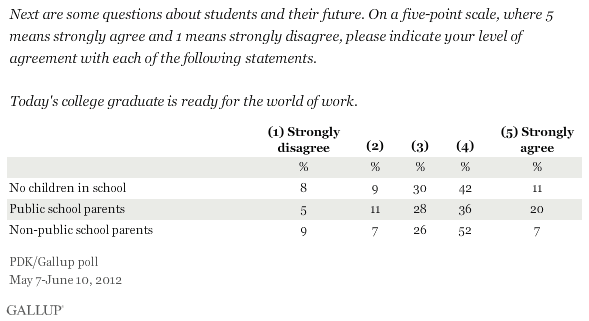WASHINGTON D.C. -- Americans have significant doubts that high school dropouts as well as high school graduates are adequately prepared for the working world, but close to half also believe college graduates lack this preparation. While 54% either strongly or somewhat agree that college graduates are ready for work, 17% disagree, and 29% are neutral on the question.
![Next are some questions about students and their future. On a five-point scale, where 5 means strongly agree and 1 means strongly disagree, please indicate your level of agreement with each of the following statements. Today's [high school dropout/high school graduate/college graduate] is ready for the world of work. May-June 2012 results](http://content.gallup.com/origin/gallupinc/GallupSpaces/Production/Cms/POLL/3fbbzoz_seueuz1uequupg.gif)
These results are based on a 2012 Phi Delta Kappa/Gallup poll question asking Americans to use a five-point scale to indicate their level of agreement or disagreement that each type of student is ready for the working world.
While parents of school-aged children share the doubts of all Americans about the workplace readiness of high school dropouts and graduates, they are more optimistic about college graduates' readiness than are people without children in school. Twenty percent of parents with children in public school strongly believe that higher education makes students job-ready, whereas 11% of those without school-aged children think likewise.

Bottom Line
Companies need employees that are ready to make meaningful contributions. Unfortunately, Americans don't consider today's high school dropouts and graduates -- most of the new people entering the workforce each year -- to be ready for the world of work. Many Americans also express doubts that today's college graduates are prepared for work, revealing that concerns about job-readiness stretch to higher education.
Survey Methods
Results for this PDK/Gallup poll are based telephone interviews with 1,002 adults (including 229 parents of public school children) nationally, aged 18 and older, randomly selected from the Gallup Panel, conducted May 7-June 10, 2012. Gallup Panel members are recruited through random sampling methods. The sample included an oversample of Panel members who reported having a child aged 5 to 18 in the household. The sample is weighted to be demographically representative of the U.S. adult population and to represent the proper proportion of parents with children between ages 5 and 18.
For results based on the total sample of national adults, one can say with 95% confidence that the maximum margin of sampling error is ±4 percentage points.
Interviews are conducted with respondents on landline telephones and cellular phones, with interviews conducted in Spanish for respondents who are primarily Spanish-speaking. Each sample includes a minimum quota of 400 cell phone respondents and 600 landline respondents per 1,000 national adults, with additional minimum quotas among landline respondents by region. Landline telephone numbers are chosen at random among listed telephone numbers. Cell phone numbers are selected using random-digit-dial methods. Landline respondents are chosen at random within each household on the basis of which member had the most recent birthday.
Samples are weighted by gender, age, race, Hispanic ethnicity, education, region, adults in the household, and phone status (cell phone only/landline only/both, cell phone mostly, and having an unlisted landline number). Demographic weighting targets are based on the March 2011 Current Population Survey figures for the aged 18 and older non-institutionalized population living in U.S. telephone households. All reported margins of sampling error include the computed design effects for weighting and sample design.
In addition to sampling error, question wording and practical difficulties in conducting surveys can introduce error or bias into the findings of public opinion polls.
For more details on Gallup's polling methodology, visit www.gallup.com.
